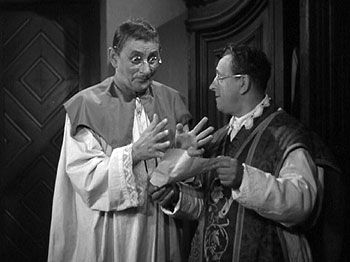Zdjęcia:
Jan RothMuzyka:
Jan KaprObsada:
Otomar Korbelář, Jiřina Štěpničková, Vlasta Burian, J. O. Martin, Josef Bek, Bohumil Machník, Vladimír Řepa, Stanislava Seimlová, Eduard Muroň (więcej)Opisy(1)
Cooperative members are harvesting crops, trying to get new water piping installed and preparing to plough away the field boundaries in autumn. Local kulak Voznica doesn't like any of this so he forces sexton Kodýtek to help him sabotage their efforts. Kodýtek floods his neighbour's basement and the suspicion falls on Tonek Pěknica. Tonek is not a cooperative member but no one believes him capable of doing evil. Tonek would like to join the cooperative but his resolute wife Tereza is categorically against it. Tonek doesn't even manage to use her weakness for the leghorn hens, which the cooperative started breeding just then. Cooperative members finish the harvest work with success, to the despair of the kulak Voznica who forces Kodýtek to perform more sabotage. Kodýtek is supposed to copy seditious pamphlets but Tonek prevents this. Then he prints new pamphlets giving publicity to the success of the cooperative in Kodýtek's name. Voznica's subversive actions are revealed. Owing to Tonek, Kodýtek comes through this without grave consequences. The event with the pamphlets convinces Tereza that their place is inside the cooperative. (oficjalny tekst dystrybutora)
(więcej)Recenzje (3)
The Hen and the Sexton is a classic constructivist movie with dancing and singing that simply serves two purposes. The first is to agitate the Moravian, more isolated and God-fearing countryside towards cooperativism, apparently in response to the Vatican's warning against cooperatives (it's mentioned several times in the film). As such there is a rather indiscriminate attack on the clergy, typically represented by an opportunist churchman, although quite surprisingly the film also includes a progressive priest, which is likely because otherwise it otherwise wouldn't have resonated with the target audience. By taking place in a Moravian village during the harvest festival, the film is thus able to incorporate not only the idyllic scenes of smiling peasants and peasant women harvesting under the heat of the sun, but also the subsequent festivities and traditions, to make it clear that in these cases collectivization will not threaten them ("After all, a water line is better than always going to the well. And it’s not like anybody’s forbidding you to go to church."). The class enemy then has no choice but to defend himself against unionism by sabotaging and manipulating the child with American Brahmin literature ("That’s what you get from those Arizonas of yours!"). The second purpose was the constant and intense humiliation of Vlasta Burian as a representative of First Republic comedy and subsequent collaborator, which makes the film a truly uncomfortable spectacle. For Burian uses the same acting register of the distracted troublemaker for which he was famous before the war, but applies it to a slimy, divisive, stupid, and selfish character who comes across as unpleasant and unnaturally twisted, even exploitative.
()
This film is a free adaptation of Zrotal's village comedy of the same name, which perhaps only stood out from what was average at the time through the character of the progressive pastor (for which the critics crucified the author) and the pleasantly strange humor, which gave in the film the temporarily pardoned Burian the opportunity to do some nice situational mischief. Still, it's sad to watch Burian's self-criticism, because he usually fabricates and devalues his comedic abilities in the rubble of the script. All other aspects of Lipský’s and Strejček’s film are in the period norm - folk humor, allegorical tractors, and agitation for the beneficial influence of collective farms. All this is interspersed with fragments of folklore and completed with a cheerful Slovak dialect. The Hen and the Sexton takes place during the time of the carnival and is eloquent proof of the infiltration of ideologized new mythology of a happy future with all hard workers, plans, commitments and other newspeak concepts into the village tradition, its transformation and re-interpretation. I'm a little sorry that the film didn’t include the scene with the carnival masks, which are made up exclusively of factory temporary workers - it had a lot of eloquence in it. From the point of view of an unbiased spectator, this comedy has nothing special about it, nothing dazzling, nothing that could captivate and leave a deeper impression.
()
The film makers may have fulfilled the plan at 114.5 per cent, but the film itself fulfilled it at 50 percent. Vlasta Burian, whatever one may say about his involvement ("probably the most shameful film," says the distributor), is the main reason to see The Hen and the Sexton. From an ordinary and really "as a punishment" role of a ridiculous mischief maker, he managed to bring quite a generous dose of humor and it is appreciated. It would also be hypocritical not to admit that the entire film, though poorly written, is at least skillfully shot. Otherwise, of course, it is an agitprop with all the trimmings, including large portraits of Gottwald and Stalin, part-time work, the construction of a water pipeline and a final toast to the ploughing of the frontier.
()


Reklama